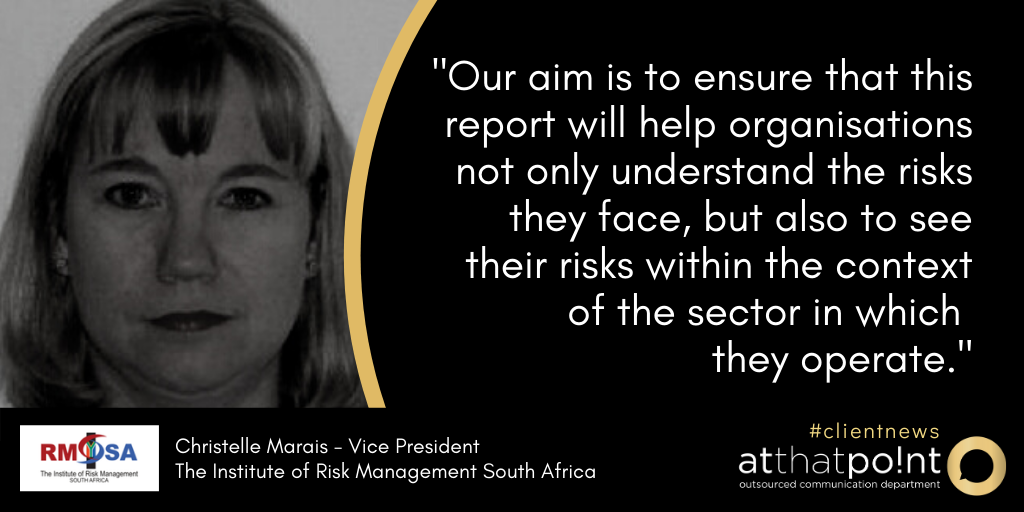|
The Institute of Risk Management South Africa (IRMSA) says that its annual Risk Report, due to be launched in February 2021, will be one of its most important yet.
Published annually, IRMSA’s Risk Report is widely seen as the definitive examination of the risks faced by South Africa and the organisations that operate within its borders. Christelle Marais, Vice President of IRMSA and the Chair of the Risk Intelligence Committee, says that the 2021 report will focus on lessons learned from the COVID-19 crisis for the risk management discipline. “Most organisations had a pervasive risks such as a pandemic on their risk registers, but few, if any, anticipated the real extent of the risk it actually posed,” she explains. “Because the world is so interconnected, the real issue is not the pandemic risk as such, but rather similar risks that could materialise in an equally far-reaching manner. Our risk report strives to answer the question: What do we as a country and as individual organisations need to be doing to deal with systemic risks of this scale?” Last year, IRMSA introduced some major methodological changes to its report, designed to make it more useful to risk decision-makers outside of the risk management discipline and to address the concerns of CFOs and COOs more directly. This approach will be continued this year, with the JSE assisting IRMSA to connect with decision-makers in the private sector; a wide range of public-sector decision-makers will also be included. “Our aim is to ensure that this report will help organisations not only understand the risks they face, but also to see their risks within the context of the sector in which they operate and the national and global socio-economic contexts, as well,” Ms Marais says. The 2021 report will be divided into five sections that take readers on a journey. Section 1 will incorporate insights from top South African leaders in the private and public sectors, small-medium enterprises and non-profits. Section 2 will examine the scenarios that South Africa is facing, and will provide a discussion about systemic thinking and risk appetite. Section 3 will then examine each of the identified risks in detail. While some of these risks will naturally have been carried over from last year, new ones will also feature—for example, the risk that COVID-19 has changed consumer behaviour for good. In the final two sections, the report will identify the competencies that South Africa as a country as well as South African organisations will need to succeed. Qualitative input will be sourced from C-Suite leaders via a survey, and highly specialised qualitative analysis will be used to generate useful insights. The report will culminate in a call to action for all to collaborate as we build a risk resilient country. “Each time a risk materialises, we learn more about what risks means in a world that’s increasingly complex,” Ms Marais concludes. “The IRMSA Risk Report is required reading in a world that is increasingly uncertain and in which the effects of risk are increasingly difficult to predict.” ENDS MEDIA CONTACT: Rosa-Mari, 060 995 6277, [email protected], www.atthatpoint.co.za For more information on IRMSA please visit: Website: https://www.irmsa.org.za/ Twitter: https://twitter.com/IRMSAInsight Facebook: https://www.facebook.com/IRMSAInsight/?ref=hl LinkedIn: https://www.linkedin.com/company/irmsa-institute-of-risk-management-sa/
0 Comments
Leave a Reply. |
Welcome to the IRMSA Newsroom
Archives
December 2020
Categories
All
|


 RSS Feed
RSS Feed